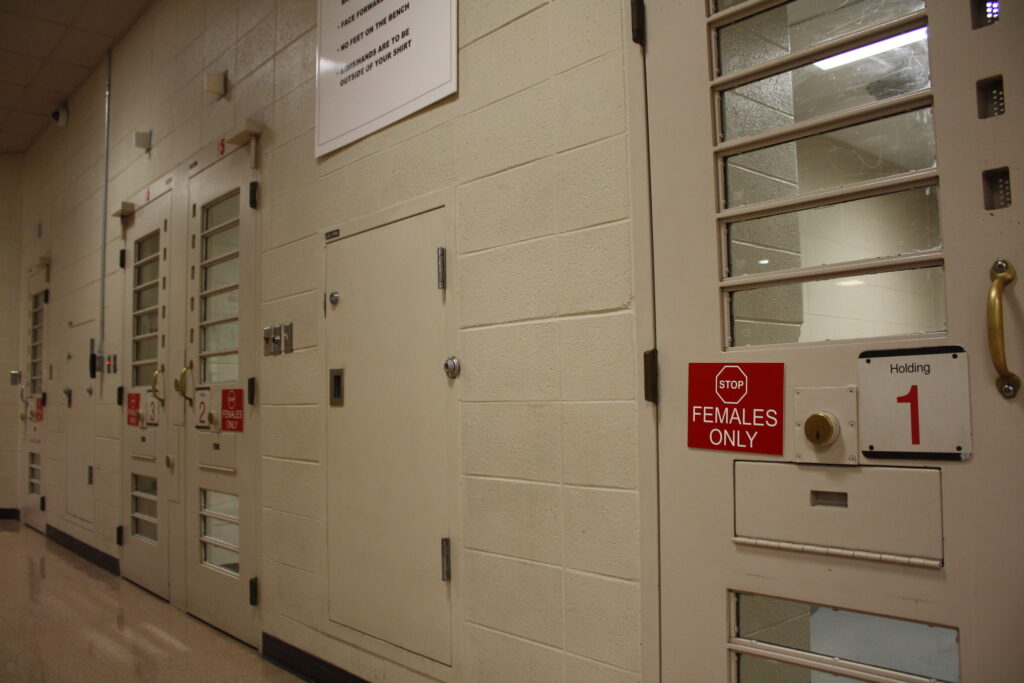Push Underway For Better Care For Pregnant Inmates
Proposals, led by Sen. Lena Taylor, include banning shackling during labor.

As of May 31, roughly 16% of women incarcerated by the Wisconsin Department of Corrections were convicted in Milwaukee County, by far the highest percentage in the state. (NNS file photo)
Cheri Branham gave birth eight years ago while she was incarcerated, calling the experience “the most traumatic thing I ever had to go through.”
She said she was not involved in the planning for how or when she would give birth. She was simply taken to a hospital without warning and induced.
In addition to the trauma of the birth, Branham said she experienced severe postpartum depression but was never seen by a medical professional for it.
A push for better medical care
Women who give birth while they are incarcerated say they need better care – for their sake and for their baby’s.
As of May 31, roughly 16% of women incarcerated by the Wisconsin Department of Corrections, or DOC, were convicted in Milwaukee County, by far the highest percentage in the state. The next highest was in Brown County, where roughly 6% of women were convicted.
Although the county where a person is convicted is not necessarily where a person lived at the time of arrest, it is usually a good indicator in most cases, said John Beard, the former director of communications for the DOC, in an email.
The DOC currently has five pregnant women in its care, and there have been four deliveries so far this year, according to data requested from the DOC. In 2022, there were six deliveries.
Policy vs reality?
Pregnant women in DOC custody are provided a prenatal plan, ongoing obstetrical treatment and postpartum physical and psychological assessments, among other services, according to the department’s website.
Many pregnancy-related decisions “are made between the patient and their medical care professional,” Kevin Hoffman, deputy director of communications for the DOC, said in an email. “With decisions related to a birth plan or inducing labor, there is no difference between incarcerated and non-incarcerated women.”
Peggy West-Schroder, executive director of FREE, said that she knows and has worked with many women where this simply was not the case.
FREE is a statewide organization that addresses the needs of incarcerated, formerly incarcerated and justice-impacted women and girls.
“In the state of Wisconsin, many, many women … are given what we call ‘forced induction,’” West-Schroder said. For example, she said, correctional officers come by a woman’s side “and they say, ‘Well, we have the staff here, and we’ve made your appointment, and you’re going in today to be induced.’”
“I’m not allowed to ever know when I’m going to leave that facility, for how long I’ll be gone or where I’m going, OK? So that in and of itself tells you that there is not a discussion,” West-Schroder added.
The Milwaukee County Sheriff’s Office, which oversees the Milwaukee County Jail, did not respond to requests for comment. The jail, however, has been the subject of past scrutiny, and litigation, over the treatment of pregnant women.
‘Unacceptable, inhumane and unnecessary’
State Sen. Lena Taylor (D-Milwaukee) said in a statement that because of a 2017 lawsuit, “we know that in the Milwaukee County Jail alone, at least 40 women were shackled while giving birth since 2011.
“In one case, a woman was shackled during 21 hours of labor,” Taylor said. “In another, correctional officers overruled the request of medical staff to remove a chain covering a patient’s belly, limiting their ability to provide treatment.”
“This is unacceptable, inhumane and unnecessary,” Taylor added.
Over the past six years, Taylor has been involved in two attempts at passing legislation that addresses maternal care for incarcerated women, including shackling.
Both attempts have failed.
In March, Taylor and state Rep. Lisa Subeck (D-Madison) announced a bill to stop the shackling of incarcerated women.
But Taylor’s office recently told NNS that instead of one overall bill, she is considering splitting the bill into three related, but separate, bills.
Proposing three more narrow bills would be a “strategic move” to prevent various portions from being removed during the legislative back-and-forth, said Christopher Bonds, legislative aide to Taylor.
“It’s really just the same bill split up so that we can make arguments for each service in each bill,” Bonds said.
Shackling policy raises concerns
The DOC’s current policy is not to shackle pregnant women, except in extreme cases where it is considered necessary for the safety of the patient, baby or medical staff, Beard said.
While Branham was not shackled while she gave birth, the practice is legal in Wisconsin, although many other states have outlawed the practice.
Catoya Roberts, board president of FREE, said Wisconsin needs to join them.
Although Roberts said she believes the Milwaukee County Jail does not currently shackle women who are giving birth, ““we don’t know for sure. And other counties do.”
While not shackling women is the policy of the administration of Kevin Carr, the secretary of the DOC, Roberts and others worry another administration could change this policy.
“Carr is very clear, ‘We don’t do this.’ But when he’s no longer the secretary, who’s to say that won’t change?” Roberts asked. “So we need to put it into law.”
Ultimately, West-Schroder said, she wants to see a shift in how incarcerated mothers are treated—one in which “we wouldn’t send pregnant women to prison or to jail.”
Devin Blake is the criminal justice reporter for the Milwaukee Neighborhood News Service. His position is funded by the Public Welfare Foundation, which plays no role in editorial decisions in the NNS newsroom.
‘The most traumatic thing’: Incarcerated mothers push for better medical care was originally published by the Milwaukee Neighborhood News Service.
If you think stories like this are important, become a member of Urban Milwaukee and help support real, independent journalism. Plus you get some cool added benefits.




















